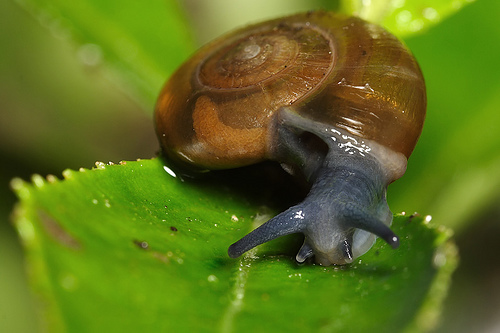Classification
Kingdom: Animalia-
Members of the kingdom
Animalia are multicellular, heterotrophic
organisms (rely on ingestion to acquire their
nutrients) that lack cell walls.
Phylum: Mollusca-
The phylum Mollusca is
comprised of coelomates that are soft-bodied and
are divided into three main body parts: the head
(except for the bivalves), a muscular foot, and
a visceral mass. Most members also possess a
toothed-tongue, called a radula. You can read
more about the radula on the
nutrition
page.
Class:
Gastropoda-
Known as the "belly foots,"
this class includes such animals as snails,
slugs, and limpets. Most of the members of this
class have a single shell that is coiled.
Another characteristic of the Gastropods is
"torsion" or the twisting of the visceral mass.
Subclass: Pulmonata-
This subclass includes
freshwater snails and slugs. Members of the subclass
Pulmonata acquire oxygen by the use of a "lung"
or pulmonary cavity, unlike other members of the
class Gastropoda.
Order:
Basommatophora
Members of the order
Basommatophora have a single pair of tentacles,
with eyes located at the base. Organisms in this
group are more primitive than some of the land
snails in the subclass Pulmonata.
Family: Planorbidae
The family
Planorbidae is comprised of the freshwater
Pulmonates. The Planorbidae are the largest
family as far as the number of genera and
species are concerned. The Planorbidae include
such creatures as the "wheel snails," the "orb
snails," and of course, the Ramshorn snail!
Genus: Helisoma
The genus Helisoma is
composed of many types of Ramshorn snails,
including the common Ramshorn snail found
prevalently in aquatic environments across North
America and Canada.
Species:
H. trivolvis
The common Ramshorn
snail!
Click the thumbnail below to
see a phylogenetic tree for the domain, kingdom,
phylum and class of H. trivolvis

Click the thumbnail below to
see a phylogenetic tree for the class, subclass,
order and family of
H. trivolvis

.jpg)
